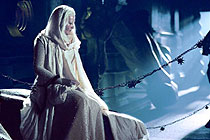|
|
|
|
The
Chronicles of Riddick
|
 |
|
One of the greatest and zaniest moments in pop culture occurred when George Miller's Mad Max 2 (1981) took off from a post-apocalyptic premise that had precious little to do with anything in the original Mad Max (1979). And why not? Such surreal freedom in the conceptualisation of a sequel is infinitely preferable to the tendency for screen series like Star Wars or The Lord of the Rings to become trapped, instalment after instalment, in the same fictional world with the same, only slightly changing characters. This freedom is once again claimed by writer-director David Twohy in The Chronicles of Riddick, the sequel to his ingenious sci-fi success Pitch Black (2000). That original, like Mad Max, was lean and minimal almost to the point of a certain avant-garde grandeur, generating maximum tension and poetic mystery from the clash of darkness and light, visibility and invisibility. As in the passage between the first two Mad Max movies, all that really survives here is the gruff, reluctant hero, Riddick (Vin Diesel, also serving as co-producer). But now he no longer simply combats terrifying creatures on a single planet. His story takes place against a cosmic, mythological, ever-changing backdrop. The dark villains this time are (in fine Star Trek style) the Necromongers, marauding through the universe and killing or jailing all "subversives" like Riddick. Our hero is the kind of stoic guy who refuses all help and eschews any ideology, but his better instincts put him at the head of a revolutionary crew. This film takes a while to get rolling. But, once it does, the spectacular action set-pieces are tremendously impressive and exciting – with one rapidly edited sequence recalling the experimental edge of Pitch Black. The most entertaining aspect of The Chronicles of Riddick is its parade of women. All of them are tough, sexy or treacherous in varying combinations, from the wise phantom Aereon (Judi Dench) to the Lady Macbeth clone Dame Vaako (Thandie Newton) via Riddick's old flame Kyra (Alexa Davalos). It is a little tempting to take the film's central slogan – "sometimes the only way to stop evil is not with good, but with another kind of evil" – as a disquieting apology for the foreign policy of the Bush regime. Whether this critique hits its mark or not, there can be no doubt that both this film and I, Robot (2004) peddle a certain kind of story that goes beyond mere heroism to extol the redemptive power of a New Messiah. Then again, we can pray that the third episode in these chronicles of Riddick will once again cheerfully disregard what has been established in the previous part and proceed to spin a completely different story that proclaims a contrary political line. © Adrian Martin July 2004 |
![]()